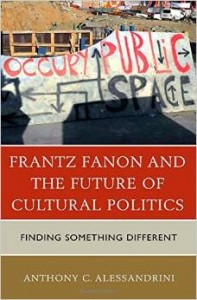Stalwart CGSC member Anthony Alessandrini’s important new book is now available: Frantz Fanon and the Future of Cultural Politics: Finding Something Different (Lexington Books, 2014).
Tony’s intellect and insight have been central to the work we’ve done through the Committee these past few years. I’m thrilled that a broader audience can now think with him, through Fanon, about some of the most pressing and vexing dilemmas of our political moment. Below are my introductory comments from a symposium that we held on this timely work in March 2014, in anticipation of its publication.

“Singularity and Solidarity: The Contemporaneity of Fanon’s Humanism”
As I read him, Alessandrini has three key methodological starting points in Frantz Fanon and the Future of Cultural Politics. First, he calls for us to read Fanon “non-piously.” He describes how Fanon studies have been plagued by selective and instrumental readings, haunted by myths and fantasms, and inflected by authors projections and identifications. For all this Alessandrini does not call for a more faithful or accurate reading of Fanon. In face, he insists that to read Fanon non-piously is to accept, more, to embrace the fact that there is no real or authentic Fanon or Fanonian text. There are only ever appropriations that are more or less persuasive or productive. Second, Alessandrini calls for us to read Fanon as our contemporary whose legacy remains vital, present, and relevant. This orientation allows him to place Fanon in dialogue with a range of seminar theorists and novelists including Edward Said, Michel Foucault, Paul Gilroy, Jamaica Kinkaid, and J.M. Coetzee. It also allows him to engage contemporary political situations through Fanon (and vice versa) including post-apartheid South Africa, Palestine, and the Arab Spring (which he provocatively calls “the African Spring”). But even as he listens and responds to Fanon as a contemporary, Alessandrini, in a third methodological orientation, also insists that we read Fanon and these interlocutors as “conjunctural thinkers” whose writings must be grasped in terms of the specific times and places, the particular historical or political situation, in relation to which they emerged. For Alessandrini this attention to historical specificity is precisely what allows the theory to be appropriated, to travel, to speak to different situations, times, and places.
His central concern through the book is Fanon’s call for “something different,” that is to say a new humanism for a new era. Alessandrini suggests that Fanon’s humanist project was inseparable from his understanding of “real decolonization” and “true liberation” as an ongoing and open-ended processes and practice that both presupposes and produces new kinds of political solidarity. For Alessandrini, “solidarity” seems to be one name for the “emergent humanism” that Fanon envisions. He identifies Fanon as engaged in a lifelong task to work through humanism from within. This task becomes Alessandrini’s entry point for re-reading Fanon’s work and reconsidering his legacy. In other words, he places at the center of his inquiry precisely that which generations of scholars have tried to gloss over, explain away, or contain, namely Fanon’s humanism.
The result is a remarkable work of scholarship that is at once focused and wide-ranging. It is the most thoughtful and insightful re-reading of Fanon that I’ve seen. At another level, it is a deep consideration of the very project of postcolonial criticism and theory. At the. Even more fundamentally, it is a serious engagement with the relationship between politics, ethics, and criticism “now” – in the current political conjuncture. Running through his substantive arguments is a second order, but no less important, concern with the place and practice of criticism in public life, with the opportunity and responsibility to undertake serious intellectual work as an ethical and political act.
More specifically, I read this book as a careful engagement with what is arguably the most pressing and challenging political question today, that of translocal solidarity. Throughout the book he wrestles with the task of conceptualizing a form of solidarity that recognizes specificity, but is grounded in what he calls singularities rather than identities. This is a solidarity that is based on translocal linkages rather than transnational sameness.
Finally, it is worth noting that in addition to being a scholar, Tony is a poet. It is no surprise then that this book is not only beautifully written but elegantly composed. It is organized as a series of movements that loop back on one another even as they drive the whole work forward.
As for his critical poetics, consider that he speaks for example of “the impossible space of responsibility between subjects that have not yet come into existence” and of “giving oneself to that which had not yet come into existence and may never come into existence, but towards which one’s actions are nevertheless aimed.”
By Gary Wilder



Singularity and Solidarity: Alessandrini on Fanon’s Humanism http://t.co/PXakzVjU2i
Here is my blog post on Tony Alessandrini’s terrific new book on Fanon.
http://t.co/BVp5lJSatA
New post on the blog: Singularity and Solidarity: Alessandrini on Fanon’s Humanism http://t.co/MfJTGC445M
New post on the @cgscatgc blog: “Singularity and Solidarity: Alessandrini on Fanon’s Humanism” http://t.co/hBKQrDJlzY
Singularity and Solidarity—Alessandrini on Fanon’s Humanism http://t.co/4cj5Yf4rZD